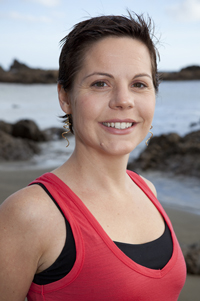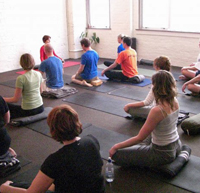by Kelly Fisher
“Should I tell the students it is my first class teaching?”
I get this question often and there are good reasons to tell them and good reasons not to tell them.
My personal bias is for transparency and honesty. Being vulnerable and open enables people to do the same.
As yoga teachers we’re holding space for our students’ personal inquiry and experience. While we can’t know what goes on inside of our students’ hearts and minds or control it, we can facilitate the kind of raw honesty self-enquiry requires by modeling it ourselves right from the very first class.
Take some time to feel into your deeper reasons for wanting to tell the class. Often we want students to be more indulgent with us if we’re feeling shaky. Vulnerability is a wise choice because often it invites a softness from others that can make your first teaching job go more smoothly.
Being honest about your vulnerability can also help you feel kinder towards yourself and any potential mistake you might feel you make. No matter how long you teach, you can always pick out things that could have gone better or differently. A key to long term sustainability as a teacher is kindness towards your foibles and stumbles. Perfectionism has no place in a yoga room, least of all in the teacher’s seat.
In some situations though, you might not feel safe to tell folks it’s your first class and that’s ok. Perhaps you don’t know the group at all. Perhaps it’s an environment that is edgy or competitive or cold. As teachers, we must meet students where they are and if the group is really not a safe place for all-out openness, you may transmit greater credibility by saying a little less about yourself.
Trust is something that builds over time and it’s a two way street. Just because you’re the teacher modeling openness doesn’t mean you have to overexpose yourself if there is a good possibility that it will create a defensiveness in the students. There’s such a thing as oversharing and it takes discernment to find the appropriate balance between boundaries and openness.
Whichever you choose, know why you’ve chosen that way. What are your motivations? How will it serve the students? How will it serve you? How does it reflect your growing edge and comfort zone as a human being?
We all come to this job/vocation/calling with a different set of beliefs, wounds, struggles, defenses and automatic responses. The thing that matters is the self-inquiry, honesty and discernment about the choices you make, particularly now that you’re teaching.
There really is no right answer. The choice you make today will depend on a great many factors and the only wrong choice is the unconscious one that is motivated by things you’re not willing to acknowledge within yourself.
About Kelly
 Kelly Fisher, e-RYT 500, has made yoga her full-time career since 2005 having spent most of the previous decade in big business IT and part of the decade before that studying Neuropsychology. Over the course of her yoga career, Kelly has studied with many teachers from various lineages including Iyengar, Astanga, Satyananda, Prana Flow and Anusara and has investigated related sciences Ayurveda, Acupuncture and Craniosacral therapy. She is grateful for the support and advice she has had on her journey.
Kelly Fisher, e-RYT 500, has made yoga her full-time career since 2005 having spent most of the previous decade in big business IT and part of the decade before that studying Neuropsychology. Over the course of her yoga career, Kelly has studied with many teachers from various lineages including Iyengar, Astanga, Satyananda, Prana Flow and Anusara and has investigated related sciences Ayurveda, Acupuncture and Craniosacral therapy. She is grateful for the support and advice she has had on her journey.

Leave a Reply